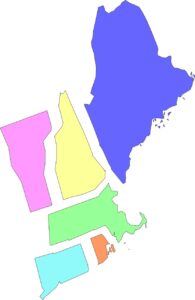The United States has been just that since 1776 – a united confederation of states, each of which was created and developed along its own unique pathway. Most Americans are well aware that each state makes its own laws and when you cross from one state to another, you can’t expect that what you can, or cannot do, in one state will be the same in the next.
But just how different are the laws in each state from each other and how do they relate to federal laws? Do states that are neighbors, geographically speaking, have similar laws? How do the laws in Massachusetts differ from the other New England states, Maine, New Hampshire, Rhode Island, Connecticut and Vermont?
We will take a snapshot of how state laws differ in this article and confine the focus to looking at employment laws in Massachusetts and how they compare to the state’s 5 nearest neighbors.
Employment law – what it covers
Employment law, or labor law as it is also called, is not a single law, but a number of laws, both federal and state, that regulate the responsibilities of employers and the rights of their employees. State laws often work in parallel to equivalent federal laws, but generally, the law that is most favorable to the employee tends to take priority.
These are the categories come under one or another federal employment law. Each state will have some sort of equivalent.
- Discrimination and harassment at work;
- Minimum wage and overtime rules;
- Child labor laws;
- Workers’ compensation;
- Wrongful discrimination and termination;
- Rights to family and medical leave;
- Unsafe workplace complaints and conditions.
Comparison of child labor laws: Massachusetts with other New England states
Child labor laws regulate what work children are able to do and at what age they are allowed to be employed. It protects children from exploitation and works to ensure their right to education. The Federal Fair Labor Standards Act (FLSA) is the main federal legislation covering child labor regulations. Where an individual state has stricter restrictions, the equivalent state child labor law has priority. Massachusetts has the strictest child labor laws amongst the 6 New England states and it also has stricter laws than given by the FLSA. For example, no child below 18 can be employed in non-agricultural work in Massachusetts. By comparison all other 5 states only restrict children younger than 16. Rhode Island has, by a slight margin, the least restrictive child labor laws.
Comparison of minimum hourly wage rules: Massachusetts with other New England states
The federal minimum wage is fixed throughout the U.S. at $7.25 an hour. In Massachusetts, the standard minimum wage (tipped workers come under a different rule) is $13.50. Because the state minimum is higher than the federal one, workers cannot be paid less than $13.50 in Massachusetts. By comparison with Massachusetts, the state’s near neighbors all have lower minimum hourly wages: in descending order, Maine at $12.15/hr, Connecticut at $12, New Vermont at $11.75/hr, Rhode Island at $11.75/hr and miserly New Hampshire at just $7.25/hr!
Comparison of overtime rules: Massachusetts with other New England states
The FLSA also regulates what employers must pay their non-salaried employees if they work more than 40 hours in any working week of 7 days. Unless the employer has an exemption from the Department of Labor (DoL), employees must be paid at a rate of one and a half times their normal hourly rate for every hour over the 40 hours. There is no specific rule about overtime being considered working on weekends or public holidays. Employees who are not paid a minimum wage or the correct overtime rate can make a complaint with the DoL’s Wages and Hours Division or the state equivalent.
Interestingly, all 6 New England states have exactly the same overtime rules as the FLSA: time and a half has to be paid over a 40 hour working week. There are small differences between the 6 states when it comes to categorizing so-called ‘exempt’ employees. Not every state across the country has overtime laws. Alabama, for example hasn’t any rules about paying overtime, but in this case, the federal overtime rule as determined by the FLSA takes priority.
Comparison of anti-discrimination laws: Massachusetts with other New England states
Federal legislation prohibits discrimination or harassment of employees because of a protected class to which they belong. These categories include: race, ethnic group, color, religious affiliation, gender (including sexual orientation, pregnancy and gender identity), age (over 40) and disability. The Equal Employment Opportunities Commission (EEOC) oversees the federal laws on discrimination and harassment at work but it only investigates violations of the respective federal laws if the affected employee is working for an employer who employs 15 or more employees.
In Massachusetts, the Massachusetts Fair Employment Practices Act (FEPA) has almost exactly the same rules as the federal equivalents and in fact the state’s anti-discrimination body, the Massachusetts Commission Against Discrimination (MCAD) has what is called a work-sharing agreement with the EEOC. A complaint by an employee must be filed within 300 days of an alleged act of discrimination or harassment. The FEPA differs from federal legislation in that employers with 6 or more employees are covered by the Act.
In Connecticut, the Connecticut Human Rights and Opportunities Act has more or less the same protected classes as Massachusetts, but includes a greater range of disabilities than the FEPA or federal law, protects employees younger than 40 for age discrimination and covers employers with 3 or more employees.
In New Hampshire, the New Hampshire Commission for Human Rights oversees state anti-discrimination legislation which is similar to that of Massachusetts (applies to employers with 6 or more employees). It also has a work-sharing arrangement with the EEOC, but as there is a state anti discrimination agency available in the state, this is a better place to go with a complaint than the nearest EEOC office which is in Boston.
Unlike the other states and federal law, Maine’s Human Rights Act covers all employers, regardless of size, and employees younger than 40 can file a complaint of age discrimination.
Rhode Island anti-discrimination laws are almost a carbon copy of the federal equivalents, while in Vermont, anti-discrimination laws are not exclusive to employment. Housing and public accommodations are covered by the same anti-discrimination laws.
Using an employment lawyer
As an employee, you can file a complaint directly with a state or federal agency dealing with employment law, but it may be wiser to talk to an experienced employment lawyer before you do so. The lawyer will know both state and federal employment laws inside out and will be able to advise how best to go about dealing with a violation of an employment law. Visit our website Mucci Legal or contact us for a free legal consultation today.


